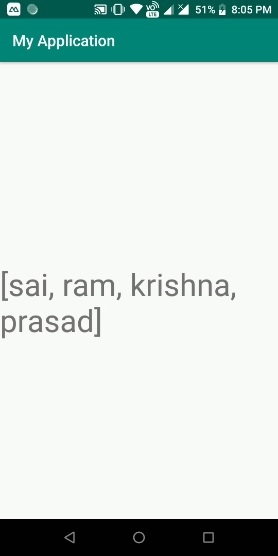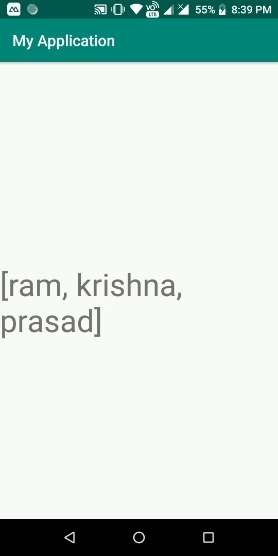
 Data Structure
Data Structure Networking
Networking RDBMS
RDBMS Operating System
Operating System Java
Java MS Excel
MS Excel iOS
iOS HTML
HTML CSS
CSS Android
Android Python
Python C Programming
C Programming C++
C++ C#
C# MongoDB
MongoDB MySQL
MySQL Javascript
Javascript PHP
PHP
- Selected Reading
- UPSC IAS Exams Notes
- Developer's Best Practices
- Questions and Answers
- Effective Resume Writing
- HR Interview Questions
- Computer Glossary
- Who is Who
How to use take() in android ArrayBlockingQueue?
Before getting into the example, we should know what arrayblockingqueue is, it travels FIFO manner and the first element going to live the longest period of time and last element of the queue going to live a short period of the time.
This example demonstrates about How to use take() in android ArrayBlockingQueue
Step 1 − Create a new project in Android Studio, go to File ⇒ New Project and fill all required details to create a new project.
Step 2 − Add the following code to res/layout/activity_main.xml.
<?xml version = "1.0" encoding = "utf-8"?> <LinearLayout xmlns:android = "http://schemas.android.com/apk/res/android" xmlns:app = "http://schemas.android.com/apk/res-auto" xmlns:tools = "http://schemas.android.com/tools" android:layout_width = "match_parent" android:gravity = "center" android:layout_height = "match_parent" tools:context = ".MainActivity" android:orientation = "vertical"> <TextView android:id = "@+id/actionEvent" android:textSize = "40sp" android:layout_marginTop = "30dp" android:layout_width = "wrap_content" android:layout_height = "match_parent" /> </LinearLayout>
In the above code, we have taken a text view to show ArrayBlockingQueue elements.
Step 3 − Add the following code to src/MainActivity.java
package com.example.myapplication;
import android.annotation.SuppressLint;
import android.os.Bundle;
import android.support.v7.app.AppCompatActivity;
import android.view.View;
import android.widget.TextView;
import java.util.concurrent.ArrayBlockingQueue;
public class MainActivity extends AppCompatActivity {
ArrayBlockingQueue arrayBlockingQueue;
String head;
@Override
protected void onCreate(Bundle savedInstanceState) {
super.onCreate(savedInstanceState);
setContentView(R.layout.activity_main);
arrayBlockingQueue = new ArrayBlockingQueue<>(50);
final TextView actionEvent = findViewById(R.id.actionEvent);
arrayBlockingQueue.add("sai");
arrayBlockingQueue.add("ram");
arrayBlockingQueue.add("krishna");
arrayBlockingQueue.add("prasad");
actionEvent.setText("" + arrayBlockingQueue);
actionEvent.setOnClickListener(new View.OnClickListener() {
@SuppressLint("SetTextI18n")
@Override
public void onClick(View v) {
try {
head = (String) arrayBlockingQueue.take();
} catch (InterruptedException e) {
e.printStackTrace();
}
actionEvent.setText("" + arrayBlockingQueue);
}
});
}
}
Let's try to run your application. I assume you have connected your actual Android Mobile device with your computer. To run the app from an android studio, open one of your project's activity files and click Run ![]() icon from the toolbar. Select your mobile device as an option and then check your mobile device which will display your default screen –
icon from the toolbar. Select your mobile device as an option and then check your mobile device which will display your default screen –

Now click on text view, it will remove the first element and display remaining elements as shown below –

Click here to download the project code

